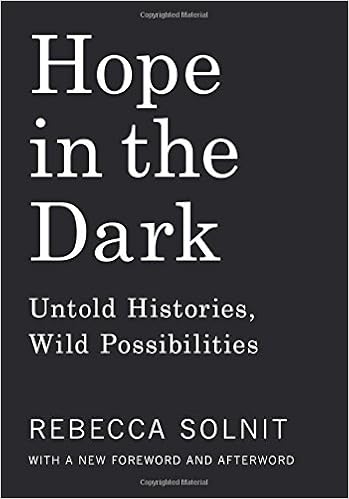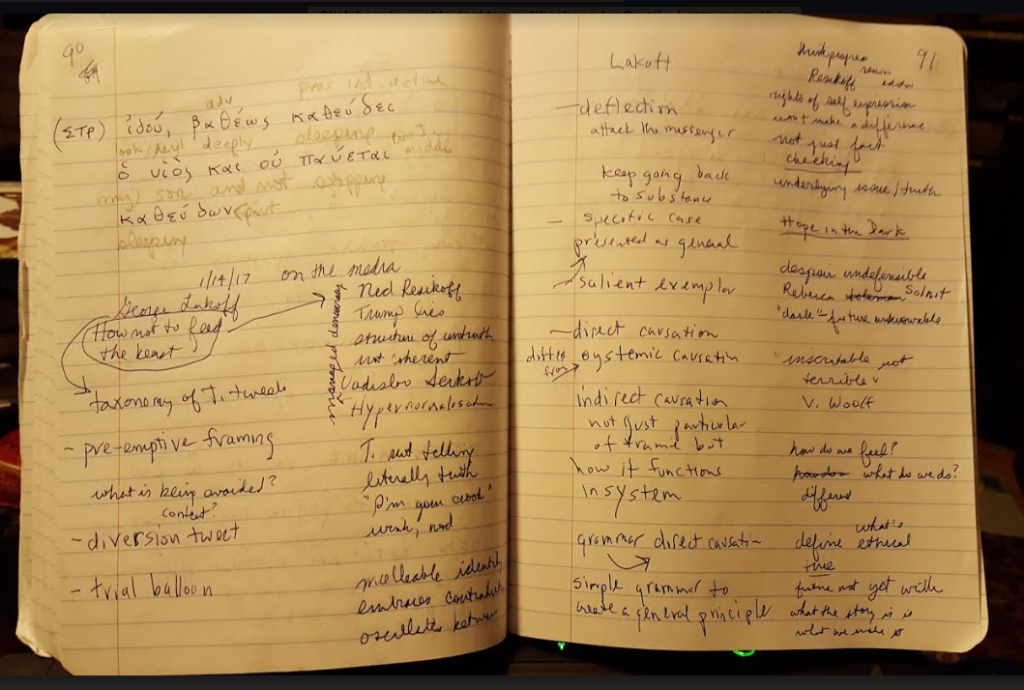
This morning my blog is basically notes I have taken on this week’s episode of On The Media.
When you repeat Trump, you help Trump

George Lakoff has made some very important observations about how framing and thinking work. In this week’s episode, he specifically talks about how to analyze and respond to Trump tweets.

Here’s the list I made:
Taxonomy of Trump Tweets
1. pre-emptive framing
2. diversion tweet
3. trial balloon
4. deflection
5. salient exemplar
You can just listen to his comments for yourself at the link above, but I’ll flesh these out a bit here.
1. pre-emptive framing
This is the basic Lakoff insight. “Don’t think of an elephant.”

When Trump refused an answer from the CNN reporter this week and called CNN fake news, this was an example of pre-emptive framing. inextricably linked to this action was the fact that Trump treated Brietbart as real news and had brought his staff with him to actually cheer and clap in the news conference. Apparently this is similar to how Putin handles news conferences in Russia but more on that later.
When you detect framing the question to ask yourself is “What is being avoided?” “What is the actual content?”
2. Diversion Tweet
Changing the subject. Trump’s tweets on Meryl Streep and Hamilton are given as examples. Instead of talking about and reporting on controversies about Trump, news agencies jump in and talk about Streep and Hamilton, much more juicy and content free.

2. Trial balloon
Throw something out in a tweet like a reference to “nukes” to judge where the issue is on people’s radar so that you know how to frame it in the future.
3. Deflection
A bit like “changing the subject” but much more malicious: Attack the messenger. This is a favorite of our president elect. The trick Lakoff says is “Keep going back to the substance.”
4. salient exemplar
An “exemplar” is one example, say insisting that when a foreign government rents one night in a Trump motel it does not constitute a “emollient” or gift forbidden by the Constitution.
Saying this is “salient” means that this example represents the entire idea of allowing foreign governments to rent your hotel rooms so that if a government rents rooms for a month it also does not constitute an “emollient” when in face it would.
I like this one a lot because it is rooted in grammar. In grammar there is such a thing as “direct causation.” Lakoff says that languages all over the world have this in their grammar. It is a necessary and clear part of how communication works. But it differs from
systemic causation
which creates a general principle so that the initial direct causation is not just a particular instance or FRAME but is presented as how it functions in a system.
Wow.
Ned Resikoff and Managed Democracy
I can see that I’m being verbose this morning and don’t want to write another 1000 words describing the next two important parts of this week’s On The Media, so here are a couple links that elucidate Resikoff’s comments.
Trump’s lies have a purpose. They are an assault on democracy.
This is basically the content of what Resikoff talks about in the program.
Here are a couple other links.
Resikoff mentions the Russian Surkov’s ideas of managed democracy in the context of incoherent presentations of “truth” whereby eventually what is important is to preserve the right to self expression and to dilute any purchase on actual facts and truth.

in October of last year, the BBC did a documentary called “Hypernormalization” about how governments are capitulating to a “fake” reality. The title comes from a book by Surkov: Everything was Forever, Until it was No More: The Last Soviet Generation. On Nov 2 of last year, this documentary was put up on YouTube. Here’s a link. I’m pretty sure my daughter Sarah recommended this documentary a while back but I didn’t get to it. Now I probably will.

Hope in the Dark

Again in the interest of brevity, I am mostly putting up links about this interview with the author, Rebecca Solnit.
Her book was offered free as an ebook right after the election. it’s still available for $5.99 at this link or $8.26 at Amazon.
Solnit’s basic insight is that the future is unknowable or “dark.” She attributes this usage to Virgina Woolf writing at another terrible time of history that the future was “inscrutable not terrible.” Another book for Jupe to read.
‘We Have to Resist’: A Conversation with Rebecca Solnit : Longreads

Yes, i recommended hypernormalisation – I thought you started it but didn’t finish it, and I think you said it was oversimplifying things.. I found it useful for a bit of context, but it does simplify – it sorta creates a dot-to-dot connecting events to get to where we are now, skipping over a lot I’m sure
As Elizabeth put on Facebook, ‘were all in this togetger!’
X x
We watched Hypernormalisatoin a bit again last night, but the YouTube version was blurry. Instead we turned to the new Netflix version of Lemony Snicket and quite enjoyed the first episode.
I thought this was an especially helpful episode. Listened to it while lying in bed and then again while driving to and from Ann Arbor this afternoon. Thanks for your notes.
Yes, I was especially glad to hear what Lakoff has to say. I convinced Eileen to listen to it as well and then she recommended it to some of her alto friends at the Grace Choir Alto breakfast yesterday. Thanks for the Solnit book. I am now keeping a doc of “possible reads” to try to track books that interest me better.
So many good links and recs here. Thanks! Listening to On the Media now. Love you!
Glad you found it helpful. Love from Dad!